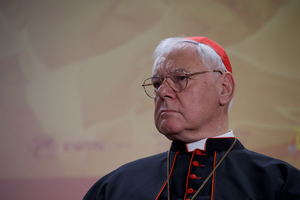Cardinal Napier Praises Trump’s Reinstatement of Mexico City Policy
However, some members of the European Parliament are taking steps to set up replacement funding to promote abortion internationally.

VATICAN CITY — Cardinal Wilfrid Napier said the Trump administration’s recent reinstatement and expansion of the Mexico City Policy shows the “tide is beginning to turn” against the “massacre of the unborn.”
In Feb. 22 comments to the Register, the archbishop of Durban, South Africa, praised the decision to reinstate the policy, which blocks all U.S. funding for non-governmental foreign-aid organizations supporting abortion advice.
He noted the policy has been opposed by those whose minds have been “dulled by the overarching ideology of ‘political correctness’ so mercilessly promoted — no, ‘enforced’ is a better word — by the United Nations and its surrogates.”
One of those “surrogates” is a group of members of the European Parliament who, on Feb. 14, drew up an amendment calling the Mexico City Policy a “direct attack on, and a setback for, gains made for women’s and girls’ rights.” They also called for the setting up of an international fund to improve access to abortion services.
The resources for such a fund, they said, should come from both national as well as EU development funding, in order to fill the financing gap left after the Trump administration’s moves to cease funding all overseas aid organizations that provide “sexual and reproductive health and rights services” — phrasing frequently interpreted to include abortion and contraception.
Last month, Trump signed an executive order to reinstate — and significantly expand — the Mexico City Policy, also called the “global gag rule” by pro-abortion activists.
In the past, the policy only applied to organizations that received family-planning funding, but it now applies to organizations that receive funding for global health assistance. The policy has been reinstated by every Republican president since Ronald Reagan and rescinded by Democratic presidents.
The members of the European Parliament’s amendment was made to a resolution being prepared for the European Council, the body charged with defining the EU’s overall political direction and priorities, ahead of a U.N. Commission on the Status of Women meeting in March.
The Netherlands and Denmark have taken similar unilateral steps by proposing the setting up of their own international abortion funds to replace U.S. government funding.
Africa Targeted
A continent highly impacted by the Mexico City Policy is Africa, where abortion providers such as the International Planned Parenthood Federation and Marie Stopes International have been trying to make inroads for many years. Trump’s executive order is therefore “much appreciated in many African countries, where abortion is not legal and where the majority of the people are unequivocally pro-life,” said Obianuju Ekeocha, founder-president of Culture of Life Africa, a group promoting life and family on the continent.
By contrast, Ekeocha said, the amendment shows they are “blinded by their pro-abortion ideology,” as it “obviously does not take into account the cultural views and values of those countries where their abortion funds will be going.”
She also called it ironic that they would describe the Mexico City Policy as a direct attack on women’s rights, as “most African cultures see abortion as a direct attack on human life.”
Cardinal Napier said the move “is indicative of just how far the European Parliament has drifted away from the people it is supposed to represent.”
Maria Hildingsson, secretary general of the European Federation of Catholic Family Associations, said if such an approach continues, then “a widespread frustration with the EU will only increase, which in its turn will weaken the social peace on our continent.”
Whether these efforts to promote abortion in Africa will succeed is questionable, however. Ekoecha said the members might raise the millions of dollars they propose, but they “will fail in their endeavor to offer ‘safe abortion’ to African women as a gift.”
“To think of it: The MEPs are offering us a well-funded way of killing our children before they are even born,” said Nigerian-born Ekoecha. “Their ‘gift’ is odious and repulsive, and it will be spurned even by the poorest of the poor in Africa, who understand that abortion always brings death to babies, destruction to families and slavery to women who live to regret it.”
Ideological Colonization?
For pro-life organizations working in Brussels, such as Hildingsson’s, the amendment wasn’t unexpected. “We were not surprised, as, unfortunately, since the last European elections in 2014, there has been a pro-abortion majority in the European Parliament,” Hildingsson said.
“The ideological colonization” in the European Parliament, Hildingsson added, is the “fruit” of this political balance, but European institutions in general are filled with an “anti-life agenda.” This was perhaps most clearly seen in May 2014, when the European Commission rejected the will of 2 million pro-life citizens who supported an initiative, called “One of Us,” which sought to ban EU funding for research and other activities that destroy human embryos.
Sources inside the European Parliament told the Register Feb. 21 that the abortion-funding amendment, which was narrowly passed by 51%-41%, was simply another attempt by radical feminists to hijack every report passing through the legislature to include language calling for abortion and same-sex rights, all without any legal basis.
In any case, the sources said, the EU Commission — the main executive branch, which has a “quasi monopoly” on legislative initiatives — would be unlikely to make such a proposal, as member states would be unlikely to agree on it. Also, the EU has no formal powers in this regard, as it is left to its 28 member states to decide whether to legalize abortion or not. Almost all of them do, however, with the exception of Ireland and Malta (Poland has also rolled back communist-era liberal abortion laws, but the nation’s parliament last year voted against a proposed law to ban abortion completely).
One official went so far as to call the move to insert the amendment “all a show” and a “major bluff,” as the EU would not be able to legally establish such a fund to finance abortions. Another official took a different view, saying such a fund is not needed because “all the tools already exist, and the EU Commission has the endorsement of the political power to fill the fund as it wishes.”
Political Impact
Even so, the amendment remains a concern because, although it is not legally binding, it can have political impact by helping parliamentary members exert pressure on national delegations.
Cardinal Napier was skeptical that African political leaders would stand up and openly oppose the actions, due to their high degree of dependency on aid from Europe — a continent, he said, that has fallen away from Christianity and “life-based values.” But he was hopeful that other civil and Church leaders would be voicing their concerns.
“My hope is that some African leaders will take their cue from the positive galvanizing effect that the ‘Black Lives Matter’ movement has generated in the U.S.A. and beyond,” he said.
As on other occasions, the cardinal has strongly protested against “ideological colonization” and again chastised the Obama administration for having forced Africa to accept such policies with “unprecedented vigor.” It is accurate, he said, “to speak of it as the new form of ‘colonization,’ this time not by physically taking over land and mineral wealth and political control, but by taking over the minds and mores of the people thus colonized.”
Pro-life EU officials said they hoped national and international groups would raise their voices to stop members’ abuse of power.
For her part, Ekeocha has put together a video and is planning on writing an open letter against “this unsolicited and repulsive gift of ‘safe abortion.’” She said she also hoped “grassroots opposition across Africa” would rise up against “this new manifestation of cultural imperialism by ideologically driven MEPs.”
“Privileged Europeans” are raising millions for “safe abortion,” Ekeocha observed, while being “tone-deaf, disregarding, dismissive and even disrespectful to the people of Africa, who want so much to be allowed to determine for themselves their own needs and priorities.”
‘Africa Will Not Be Enslaved’
Quoting the late Sékou Touré, Guinea’s first president, Ekeocha said: “We prefer freedom in poverty to slavery in opulence.”
“Africa will not be enslaved by the wealth of the European Parliament,” she said, “and this is precisely why they will fail.”
Edward Pentin is the Register’s Rome correspondent.
- Keywords:
- edward pentin
- european parliament
- international abortion
- mexico city policy
- trump administration


















